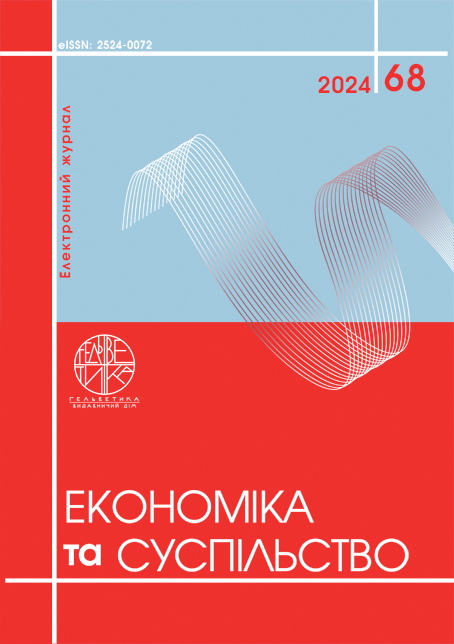SECURITY-ORIENTED MANAGEMENT OF FINANCIAL SUSTAINABILITY AS A DIRECTION OF BUSINESS ACTIVITIES FINANCIAL MANAGEMENT
Abstract
The article is devoted to the study of the theoretical basis of security-oriented management of financial stability as a direction of entrepreneurial activity financial management. The relevance and importance of the issue of managing the financial stability of the business entity is indicated. The indicator of financial stability is an important characteristic of the business activity economic security, especially during a crisis. Some definitions of the term «financial stability» proposed by domestic scientists are given. Peculiarities of interpretations by scientists of the «financial stability» category were considered. It is noted that the category «financial stability» is considered mainly as an ability, state or result. Certain definitions of the term contain two or all three of the mentioned characteristics. Approaches to the definition of the term «financial stability» are summarized and a structural-logical model of the relationship of various categories, which are components of the definition, is formed. The model contains such constituent categories as «capital structure», «profit», «self-financing», «development» and others. The model also provides for the influence of the variability of the external and internal environments. An own view on the definition of the category «financial stability» is offered. A complex of indicators of financial sustainability of entrepreneurial activity, which are studied by foreign specialists, has been systematized. Prospective directions for improving the management of the financial stability of entrepreneurial activity have been determined, which are summarized according to four vectors, namely, economic, managerial, information technology and personnel vectors. It is noted that the management vector and the personnel vector require special attention today due to the need to develop modern management measures and mechanisms. Important areas are risk management, interaction with personnel and stakeholders, team management and human potential development. Attention is focused on the need to introduce a policy of «flexible management» regarding security-oriented management of the business activities financial stability.
References
Борзенко В.І., П’ятак Т.В. Управління фінансовою стійкістю підприємства. Вісник НТУ «ХПІ». 2020. № 6. С. 66–70.
Докієнко Л.М. Концептуальні підходи до комплексної діагностики фінансової стійкості підприємства. Підприємництво та інновації. 2020. Випуск 14. С. 25–31.
Партин Г.О., Папірник С.Є. Забезпечення фінансової стійкості підприємства за умов нестабільності середовища функціонування. Економіка підприємства та організація виробництва. 2022. № 3-4. С. 129–135.
Бабко Н.М., Сєвідова І.О. Забезпечення фінансової стійкості підприємств готельно-ресторанного бізнесу. Ефективна економіка. 2024. № 3. URL: https://nayka.com.ua/index.php/ee/article/view/3299 (дата звернення: 25.10.2024).
Giancotti M., Mauro M. Building and improving the resilience of enterprises in a time of crisis: from a systematic scoping review to a new conceptual framework. Economia Aziendale Online. 2020. № 11(3). P. 307–339.
Leon P. Four pillars of financial sustainability. Arlington: The Nature Conservancy, 2001. 29 p. URL: https://pdf.usaid.gov/pdf_docs/PNADF342.pdf (дата звернення: 23.10.2024).
Занора В.О., Зачосова Н.В. Управління ризиками проєктів розвитку підприємства: теоретико-методичні засади. Приазовський економічний вісник. 2020. Випуск 1(18). С. 82–86.
Zanora V., Zachosova N. Project team formation. «Back to the Future. Social-economic Challenges and Perspectives»: International symposium «Experience. Knowledge. Contemporary Challenges» 8th edition. (Bucharest, 27-28 may 2021). Bucharest, 2021. P. 217–227.
Занора В.О., Зачосова Н.В., Поковба Д.В. Управління кадровою політикою суб’єкта господарювання: теоретичний базис. Економіка та суспільство. 2022. № 38. DOI: https://doi.org/10.32782/2524-0072/2022-38-3 (дата звернення: 25.10.2024).
Занора В.О. Мотивація команди для управління проєктами розвитку підприємства: практичні засади. Науковий погляд: економіка та управління. 2020. № 1(67). С. 67–73.
Занора В.О., Зачосова Н.В. Формування кадрового потенціалу інноваційного розвитку України в умовах Індустрії 4.0: ретроспектива, сьогодення. Проблеми системного підходу в економіці. 2019. Випуск 1(69). С. 86–93.
Занора В.О. Інноваційний розвиток підприємств в Україні: особливості та проблемні аспекти за умов Індустрії 4.0. Вісник Черкаського університету. 2019. № 2. С. 27–33.
Borzenko V.I., Pyatak T.V. (2020). Upravlinnia finansovoiu stiikistiu pidpryiemstva [Management of the financial stability of the enterprise]. Visnyk NTU «KhPI», no 6, pp. 66–70.
Dokiienko L.M. (2020). Kontseptualni pidkhody do kompleksnoi diahnostyky finansovoi stiikosti pidpryiemstva [Conceptual approaches to the diagnosis of financial stability of the enterprise]. Pidpryiemnytstvo ta innovatsii, no 14, рр. 25–31.
Partyn H.O., Papirnyk S.Ye. (2022). Zabezpechennia finansovoi stiikosti pidpryiemstva za umov nestabilnosti seredovyshcha funktsionuvannia [Ensuring the financial stability of the enterprise in an unstable environment]. Ekonomika pidpryiemstva ta orhanizatsiia vyrobnytstva, no 3-4, pp. 129–135.
Babko N.M., Sievidova I.O. (2024). Zabezpechennia finansovoi stiikosti pidpryiemstv hotelno-restorannoho biznesu [Ensuring the financial sustainability of hotel and restaurant business enterprises]. Efektyvna ekonomika, no 3. Available at: https://nayka.com.ua/index.php/ee/article/view/3299 (accessed 25 October 2024).
Giancotti M., Mauro M. (2020). Building and improving the resilience of enterprises in a time of crisis: from a systematic scoping review to a new conceptual framework. Economia Aziendale Online, no 11(3), pp. 307–339.
Leon P. (2001). Four pillars of financial sustainability. Arlington: The Nature Conservancy, 2001. 29 p. Available at: https://pdf.usaid.gov/pdf_docs/PNADF342.pdf (accessed 23 October 2024).
Zanora V.O., Zachosova N.V. (2020). Upravlinnia ryzykamy proiektiv rozvytku pidpryiemstva: teoretyko-metodychni zasady [Risk management of enterprise development projects: theoretical-methodical background]. Pryazovskyi ekonomichnyi visnyk, no 1(18), pp. 82–86.
Zanora V.O., Zachosova N.V. (2021). Project team formation. «Back to the Future. Social-economic Challenges and Perspectives»: International symposium «Experience. Knowledge. Contemporary Challenges» 8th edition (May 27-28, 2021) (217–227). Bucharest: «Artifex» university of Bucharest.
Zanora V.O., Zachosova N.V., Pokovba D.V. (2022). Formuvannia kadrovoho potentsialu innovatsiinoho rozvytku Ukrainy v umovakh Industrii 4.0: retrospektyva, sohodennia [Human resources policy management of the business entity: theoretical basis]. Ekonomika ta suspilstvo, no 38. DOI: https://doi.org/10.32782/2524-0072/2022-38-3 (accessed 25 October 2024).
Zanora V.O. (2020). Motyvatsiia komandy dlia upravlinnia proiektamy rozvytku pidpryiemstva: praktychni zasady [Motivation of the team for managing enterprise development projects: practical background]. Naukovyi pohliad: ekonomika ta upravlinnia, no 1(67), pp. 67–73.
Zanora V.O., Zachosova N.V. (2019). Formuvannia kadrovoho potentsialu innovatsiinoho rozvytku Ukrainy v umovakh Industrii 4.0: retrospektyva, sohodennia [The formation of staff potential of innovative development in Ukraine in the conditions of Industry 4.0: retrospectives, today]. Problemy systemnoho pidkhodu v ekonomitsi, no 1(69), pp. 86–93.
Zanora V.O. (2019). Innovatsiinyi rozvytok pidpryiemstv v Ukraini: osoblyvosti ta problemni aspekty za umov Industrii 4.0 [Innovative development of enterprises in Ukraine: features and problem aspects in the conditions of Industry 4.0]. Visnyk Cherkaskoho universytetu, no 2, pp. 27–33.

This work is licensed under a Creative Commons Attribution 4.0 International License.


